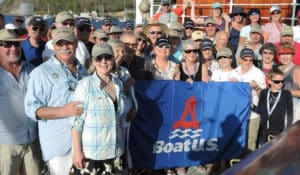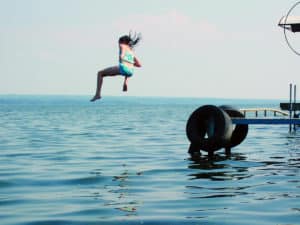It’s been a while since I’ve spent ink on the subject of anchoring. No, I’m not referring to chain versus rode, or plow versus navy. The scope of this column (excuse the pun) is focused on what some misguided aquatic activists refer to as “anchoring rights.” If you are not up to speed on this movement, here’s the deal. It basically boils down to a group of folks who believe that bums with boats (or pretty much anything that floats) should be allowed to anchor anywhere they please. Before you ink your own quill and label me a yachting elitist, please, hear me out.
First, I am a cruising yachtsman. Because “cruising” is a bit of nautical nomenclature that anchoring activists often skew in the spin cycle, I will define my terms. By common definition a cruising yachtsman cruises, which means it is more likely than not that he or she hangs a sail (not laundry) on a mast or uses an engine for propulsion (and not ballast). In other words, those serious about cruising do not loiter long enough to collect barnacles or become one with the bottom.
Like most cruising yachtsmen, I have a home on the hard, but look forward to casting off as often as possible. In the language of the landsman, we park our boat at our dock as you might park a motor home in your driveway.
While I love cruising, I have also dreamed of living aboard and would do so if the admiral of our fleet would give up her shore-side command. Now, I have always thought that there is a difference between living aboard and being a liveaboard-and I would prefer the former. It’s sea-mantics I suppose, but to my ear, living aboard simply sounds more comfortable. To continue the shore-side RV analogy, comfort in my mind would require a doublewide or perhaps a manufactured home.
Yes, a houseboat or a full-bodied trawler would suit me just fine. (If you happen to live on a 20-foot sailboat with a 60-pound dog and a parrot, don’t be sore. I wish you the best as well as a shovel, earplugs and a good chiropractor.) However, if you live aboard full time, regardless of the size of your estate, securing it to a dock when you are not “cruising” seems common sense. It is a small investment to make as a member of a shore-side community-the equivalent of a mobile-home park versus, say, the free overnight parking at a Wal-Mart.
Why have I drawn such an unflattering analogy, at the risk of nearly depleting my nautical dictionary? It’s to make the point that the hoopla over anchoring rights really has nothing to do with cruisers or folks who live aboard. It is a different sort of sea creature that has created the controversy. For them sour grapes come in the shapes of mooring buoys. Mooring buoys make possible the idea that, for a small fee, towns might offer cruisers a front row seat and oftentimes such services as pump-out, restrooms, laundry facilities and Internet access. And skippers won’t have to worry about setting their anchors or banging into one another.
Sounds great, doesn’t it? Well, for those who cruise it is, but some folks feel that such fees are an assault on their rights. The argument that is typically offered is that rich landowners are to blame for buying up all the waterfront property and building nice homes. These landowning lubbers are simply jealous that someone with a worn-out camper screwed to the semi-submerged remains of a 1963 Owens Tahitian can live in their restricted, gated, secured and generally upscale neighborhood-without an ascot! Instead of viewing these floating curiosities as part of the unique culture of the waterfront, these land-mongers see them as eyesores. (Can you imagine? The nerve!)
Well, here’s the other side of the coin. As I own property on the water (outside of the gates) I can assure you that it makes little difference to me whether a vessel is a boat or a barge, or whether its skipper wears cut-offs or pink pants with little green whales. It’s simply a matter of density. I already live in a state with zero lot lines, and I don’t care to have another neighbor peering in my windows or to watch a guy in his skivvies emptying his bilge after a sunset six-pack.
So, attention: Those seeking a permanent waterborne, waterfront residence free of charge, now hear this! My hose is not your hose and my dock is not your dinghy landing. I do not have a dumpster in my backyard for your trash or a pump to suckle your sewage. Like most folks I have to pay for such niceties-and you might consider doing the same. What’s more, please don’t buy a boat if you cannot afford to park it somewhere. When the next hurricane comes, I do not want your barge plowing through my dock and sinking in my swimming pool. It’s been months since Wilma blew through town and the remains of the remains that the irresponsible left on the hook in harm’s way are still piled up in folks’ backyards.
After 45 years of passionate pleasure boating, it is no pleasure taking the side of a landsman. But this issue is soiling the sport and our waterways. Until Wal-Mart opens a waterfront location or the Corps of Engineers builds rest stops on the ICW, there’s no free parking.









